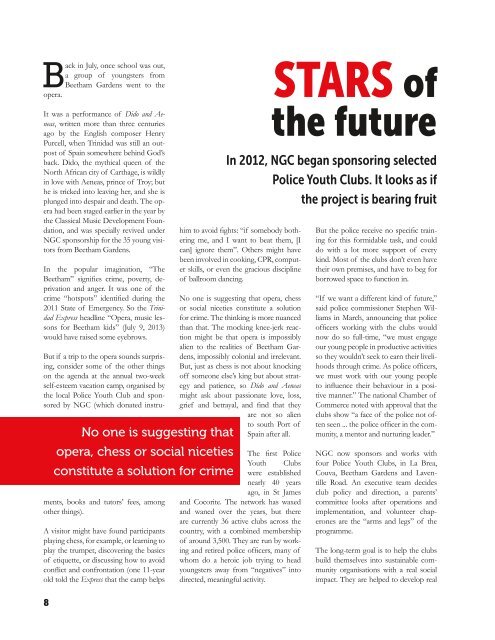GASCO News (Volume 24, November 2013)
Produced for the National Gas Company of Trinidad & Tobago
Produced for the National Gas Company of Trinidad & Tobago
Create successful ePaper yourself
Turn your PDF publications into a flip-book with our unique Google optimized e-Paper software.
Back in July, once school was out,<br />
a group of youngsters from<br />
Beetham Gardens went to the<br />
opera.<br />
It was a performance of Dido and Aeneas,<br />
written more than three centuries<br />
ago by the English composer Henry<br />
Purcell, when Trinidad was still an outpost<br />
of Spain somewhere behind God’s<br />
back. Dido, the mythical queen of the<br />
North African city of Carthage, is wildly<br />
in love with Aeneas, prince of Troy; but<br />
he is tricked into leaving her, and she is<br />
plunged into despair and death. The opera<br />
had been staged earlier in the year by<br />
the Classical Music Development Foundation,<br />
and was specially revived under<br />
NGC sponsorship for the 35 young visitors<br />
from Beetham Gardens.<br />
In the popular imagination, “The<br />
Beetham” signifies crime, poverty, deprivation<br />
and anger. It was one of the<br />
crime “hotspots” identified during the<br />
2011 State of Emergency. So the Trinidad<br />
Express headline “Opera, music lessons<br />
for Beetham kids” (July 9, <strong>2013</strong>)<br />
would have raised some eyebrows.<br />
But if a trip to the opera sounds surprising,<br />
consider some of the other things<br />
on the agenda at the annual two-week<br />
self-esteem vacation camp, organised by<br />
the local Police Youth Club and sponsored<br />
by NGC (which donated instruments,<br />
books and tutors’ fees, among<br />
other things).<br />
A visitor might have found participants<br />
playing chess, for example, or learning to<br />
play the trumpet, discovering the basics<br />
of etiquette, or discussing how to avoid<br />
conflict and confrontation (one 11-year<br />
old told the Express that the camp helps<br />
8<br />
No one is suggesting that<br />
opera, chess or social niceties<br />
constitute a solution for crime<br />
him to avoid fights: “if somebody bothering<br />
me, and I want to beat them, [I<br />
can] ignore them”. Others might have<br />
been involved in cooking, CPR, computer<br />
skills, or even the gracious discipline<br />
of ballroom dancing.<br />
No one is suggesting that opera, chess<br />
or social niceties constitute a solution<br />
for crime. The thinking is more nuanced<br />
than that. The mocking knee-jerk reaction<br />
might be that opera is impossibly<br />
alien to the realities of Beetham Gardens,<br />
impossibly colonial and irrelevant.<br />
But, just as chess is not about knocking<br />
off someone else’s king but about strategy<br />
and patience, so Dido and Aeneas<br />
might ask about passionate love, loss,<br />
grief and betrayal, and find that they<br />
are not so alien<br />
to south Port of<br />
Spain after all.<br />
The first Police<br />
Youth Clubs<br />
were established<br />
nearly 40 years<br />
ago, in St James<br />
and Cocorite. The network has waxed<br />
and waned over the years, but there<br />
are currently 36 active clubs across the<br />
country, with a combined membership<br />
of around 3,500. They are run by working<br />
and retired police officers, many of<br />
whom do a heroic job trying to head<br />
youngsters away from “negatives” into<br />
directed, meaningful activity.<br />
stars of<br />
the future<br />
In 2012, NGC began sponsoring selected<br />
Police Youth Clubs. It looks as if<br />
the project is bearing fruit<br />
But the police receive no specific training<br />
for this formidable task, and could<br />
do with a lot more support of every<br />
kind. Most of the clubs don’t even have<br />
their own premises, and have to beg for<br />
borrowed space to function in.<br />
“If we want a different kind of future,”<br />
said police commissioner Stephen Williams<br />
in March, announcing that police<br />
officers working with the clubs would<br />
now do so full-time, “we must engage<br />
our young people in productive activities<br />
so they wouldn’t seek to earn their livelihoods<br />
through crime. As police officers,<br />
we must work with our young people<br />
to influence their behaviour in a positive<br />
manner.” The national Chamber of<br />
Commerce noted with approval that the<br />
clubs show “a face of the police not often<br />
seen ... the police officer in the community,<br />
a mentor and nurturing leader.”<br />
NGC now sponsors and works with<br />
four Police Youth Clubs, in La Brea,<br />
Couva, Beetham Gardens and Laventille<br />
Road. An executive team decides<br />
club policy and direction, a parents’<br />
committee looks after operations and<br />
implementation, and volunteer chaperones<br />
are the “arms and legs” of the<br />
programme.<br />
The long-term goal is to help the clubs<br />
build themselves into sustainable community<br />
organisations with a real social<br />
impact. They are helped to develop real


















